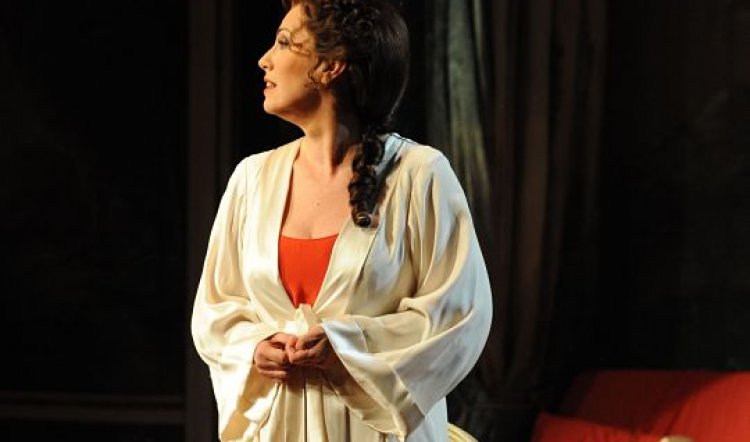
der rosenkavalier
DER ROSENKAVALIER, Opera Australia at the Sydney Opera House, a co-production with Welsh National Opera; October 1-30, 2010. Photos: Branco Gaica.
“SO BE IT,” sighs the Marschallin, with dignified yet heartrending resignation. It’s one of the most poignant moments in opera as the older woman recognises the inevitability that, sooner rather than later, young Octavian will leave her for a younger lover. The poignancy is even greater, in Opera Australia’s final production of the 2010 winter season, as Cheryl Barker makes her debut in the role; because she is just magnificent.
Der Rosenkavalier takes place mainly within the stylised end-of-Enlightenment boudoir of Marie Therese, Princess von Werdenberg – the Marschallin – in the production originally conceived in 1990 by Brian FitzGerald with designer Carl Friedrich Oberle. This setting, with its lofty ceilings, minimal furnishings, alcove-set long windows and soft “natural” lighting (Nigel Levings) highlights the sense of place, passing time, ending of an era and other elements of melancholia that underpin the waltz-time fun and high jinks. It also serves as a reminder of what “old Vienna” – and the Europe it symbolises here – were really like; particularly for women, young, old and of upper and lower classes. And first staged, with great success, in the few years before WW1: with modernism in full swing but women still treated as chattels, dependent and prettily helpless.
The comedy of the piece – pantomime-like in the main with Octavian in the Buttons tradition and Baron Ochs as the buffoon – serves as a smokescreen behind which the bitter-sweet heart of the story is played out. Marie Therese is married to a high official of the Austrian court – the Feldmarschal – who hunts, has mistresses and does important fieldmarshal-type things while she ornaments his status and home and has a very discreet lover, the teenage Octavian.
The opera opens with the sun streaming in through one of the long windows to fall gently on the sleeping lovers. It is a rare and necessarily fleeting moment of bliss. When the servants arrive with breakfast, Octavian is dispatched, with clothes and sword, under the bed. In the person of mezzo Catherine Carby he is a spunky, strapping youth who is as passionate about his lover as he is in his naïve belief that their love will last forever; and that she shouldn’t be so terrified of being found out. But Marie Therese is exactly twice his age and she knows he is wrong on both counts.
When her dreadful distant cousin Baron Ochs (Manfred Hemm) arrives, seeking the Marschallin’s assistance in his wooing of a nubile young thing, it sets in train a chain of events that belies the Baron’s ravishingly winsome musical motif. He wants her advice in selecting a young knight to deliver the traditional silver rose to the bride-to-be. The social rank of the knight is important to the Baron in wooing the girl’s rich father (the real object of his attention).

Marie Therese suggests Octavian: his nobility is beyond question (and it will also help cool his hot head somewhat and give her a bit of breathing space). But of course, her prediction comes true; when he meets young Sophie (Emma Pearson) he is lost. It’s not that easy, of course, for a start he’s had to spend some time disguised as the Marschallin’s chambermaid and thus earned the undying lust of the Baron. And if that’s not enough, Sophie’s father, the newly ennobled Herr von Faninal (Warwick Fyfe) is not a bit amused that his wilful minx of a daughter is suddenly intent on thwarting his socially ambitious plans.
The chorus, supporting cast and principal cast members in this revival are terrific, combining fine voices with seriously decent acting skills. Hemms’s Baron Ochs is so almost-pleasant, in a lese majeste fashion, it makes his unctuous behaviour towards the Marschallin and his drooling attentions to “the maid” even more repellent than if he were an out-and-out cad and bounder.
Fyfe’s Faninal is a dandified, lemon-lipped schemer who is fully cognisant of his rights over his daughter. He has no intention of allowing anything as silly as “love” to come between him and high society. And as his exuberant yet sweetly innocent daughter, Sophie, Pearson is a bright-voiced and convincing heroine. The full significance of how good is this cast comes in the final act when the women unite in one of the most beautiful trios in western music. And as it comes after some of the most intricate and sophisticated vocal quartets in western music, the effect is breathtaking.
Conductor Andrew Litton leads the singers and OA orchestra in a truly beautiful operatic and theatrical experience; at the apex of it is Cheryl Barker; if you don’t weep at the plight of the woman she so tenderly portrays, I give up.



